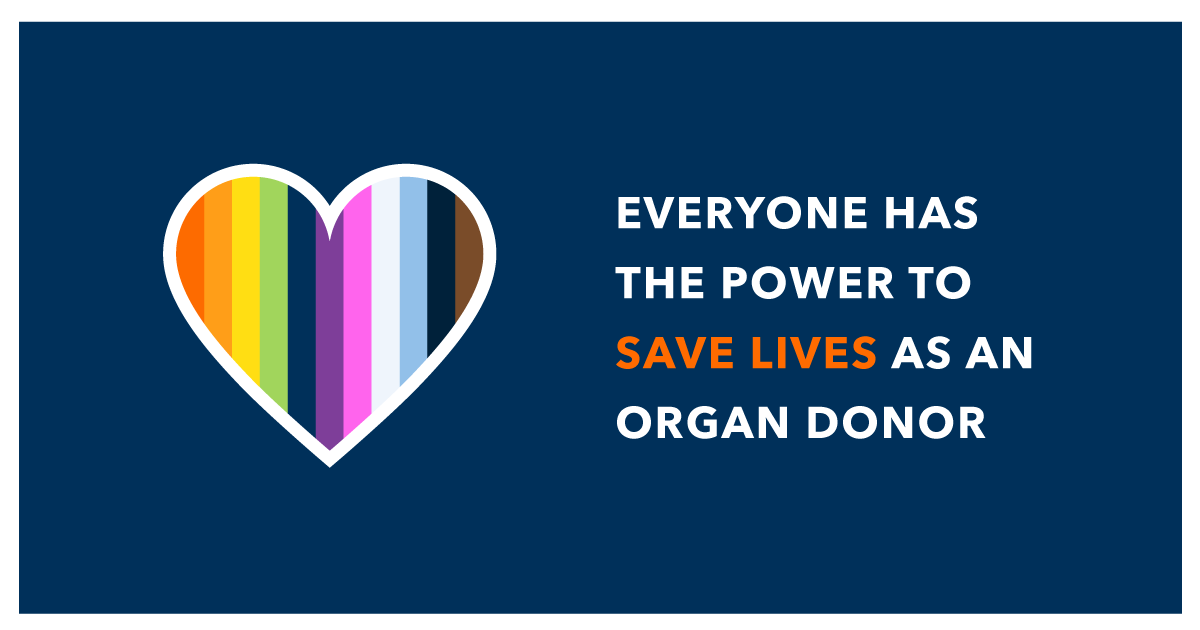Donation in the LGBTQIA+ Community
Donor registration is open to any one of any gender, gender identity or sexual orientation.

Everyone can register to be a donor!
Donor registration is open to any one of any gender, gender identity or sexual orientation. Everyone can register. People of any age, faith, health status/history, language, country of origin or background are welcome to register. So, if you want to save lives through donation, please register!
It may be surprising to learn that there are very few medical rule-outs for donation. People who have had diabetes, hepatitis, cancer or who cannot donate blood may still be able to be organ donors. In some cases, those who are HIV+ can donate to others who are HIV+, thanks to the 2013 Hope Act.
For every donation opportunity, qualified physicians evaluate the health and suitability of organs, eyes and tissue at the time of death. There is no way to know when a person will pass away and create the possibility for donation. With advances in medicine happening all the time, we do not know what options may exist at the time of someone’s passing. This means that conditions that may rule out donation today may not in the future.
Registering to be a donor is one way to let the people you love know your wishes after you are gone. If you believe in donation, registering is important because it helps ensure that transplantable organs are not lost due to lack of authorization. By registering, you create an opportunity to save lives.
Questions We’re Asked Often
Can someone who is gay be an organ donor?
Yes. Organ donation policy is regulated by the U.S. department of Health and Human Services (HHS). A person’s sexual orientation, gender, gender identity or expression does NOT prevent that person from becoming an organ donor. Anyone who believes in donation is encouraged to register as a donor.
Can someone who is gay be an eye and tissue donor?
Tissue and eye donation policy is regulated by the U.S. Food and Drug Administration (FDA). The FDA has a male-to-male sex deferral policy which could prevent a man who has been sexually active with a man in the past 5 years from donating his tissues or eyes. Organ procurement organizations -such as LifeSource- are mandated to follow the FDA policy for eye and tissue donation.
There is no way to know when a person may become a donor and what options may exist at that time. Conditions that may rule out donation today may not in the future. So, if you believe in donation, we encourage you to register as a donor.
Can someone who is gay receive an organ transplant?
Yes!
A person’s sexual orientation and gender identity or expression race, income, celebrity and social status have no determination over whether they receive an organ transplant.
Recipients are determined by medical factors. A national system matches available organs from the donor with people on the waiting list based on blood type, body size, how sick they are, donor distance, tissue type and time on the list.
An important note about gender designation when registering
It’s important that the gender designation a person gives when registering matches that of the other, current legal documents that person has, like a driver’s license or passport. This is because the donor registration record is a legal document and is used for legal identification after a person has passed away and is being evaluated for donation.
If the gender listed on the donor registration and current legal documents do not match, the registration cannot legally be considered a match and will not provide consent for donation for a potential donor. For this reason, it is recommended that you register using your current legal gender designation – whether it is your birth gender or the result of a legal change in gender marker. You can update the gender designation on your donation registration record at any time should your legal gender marker change in the future.
Have questions? Contact us at 1.888.5.DONATE or info@life-source.org
 Skip to main content
Skip to main content
